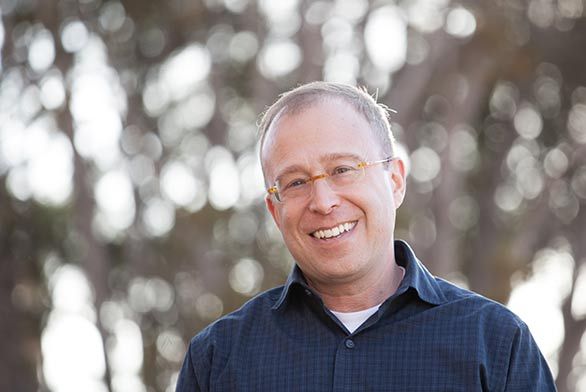Ned Walpin Looks Back on 24 Years at St. John’s College—and Steering the Graduate Institute Through a Global Pandemic
April 24, 2024 | By Catherine Darling Fitzpatrick (SF16)
In his 24 years at St. John’s College, Ned Walpin, the Graduate Institute’s outgoing associate dean, has seen the Program send countless students and faculty alike toward a version of enlightenment. Walpin’s use of the word “enlightenment” is intentional: his time leading classes in the Eastern Classics masters program in Santa Fe has profoundly influenced his approach as an educator and administrator.

Discussing the Program’s ability to “loosen the control of the ego” with Walpin showcases a deep understanding he has cultivated through teaching texts like the Mahabharata and the Discourses of the Buddha. This “ego-relaxing” quality extends beyond his experience of academia. “The biggest hobby of mine where that [quality] helps is jazz piano, which I’ve been working on for years.” He also loves skiing and hiking, both of which are readily available in Santa Fe and nearby Taos.
Walpin will have more time for humbling hobbies after stepping down from his GI associate deanship role at the end of the semester. The transition marks the completion of his time spent in college administration, which occurred intermittently over the past 14 years between periods of working as a tutor. Before managing the college’s Eastern Classics and Masters of Arts in Liberal Arts programs as associate dean, he also served as assistant dean, interim dean, and college-wide executive director of enrollment management.
Walpin has long approached guiding Johnnies not with superior knowledge, but with perspective gained from “a few additional years on my maturity odometer,” he says. He emphasizes the importance of tutors using their own academic experience and self-awareness to engage in class conversations while also gently leading students through their time at the college.
“One of the coolest things is at the senior toasts [in Santa Fe], you see this transformation take place,” Walpin says. “These students have achieved a real level of thoughtfulness and quiet bravery, a level of skill, that new freshmen and new tutors alike can look at and see with their own eyes.”
While the Eastern Classics program may more overtly explore concepts like ego, liberation, and compassion, Walpin asserts that “thinking about ego is everywhere” in the school’s undergrad and graduate curriculums, spanning both Eastern and Western canons. Liberation from ego in a St. John’s classroom starts, as Walpin puts it, the moment you “move from nervously guarding your expertise to a more freeing position of knowing what you don’t know.
He recalls his own experience of being untethered from subject-matter expertise, which occurred during his first year of teaching undergraduates. “Euclid felt extremely challenging at first,” says Walpin, who holds both a master’s in English and Political Science and a PhD in political science. “It was very liberating to realize I didn’t have to defend my status as ‘expert’ in order to be a good first-year tutor.”
Walpin knows that a St. John’s-type education is not a one-size-fits-all method. For instance, his daughter is heading to Vassar next year so she can focus on theater, despite being what Walpin calls “a natural fit” for the St. John’s Program. He acknowledges it might not be suitable for everyone; it “certainly would not have been right for me in my twenties,” he says.
All that said, Walpin says he does see differences between St. John’s graduates and those from other BA and BS programs. He attributes most of this to a sense of confidence that comes from humility, and the ability to “really learn” rather than just acquiring knowledge. “What most BA or BS students get out of their undergraduate degree, maybe falsely, is the idea that they know something,” he says. “I’m not convinced St. John’s students fall for that error.”
Walpin’s early days in 2020 as associate GI dean coincided with the onset of COVID-19. Amidst the chaos of transitioning classes online, Walpin recounts highs and lows—including the surprising success of virtual GI classes, which led to a low-residency master’s degree for those who can’t complete the degree in person.
“I think the way we’ve developed online programming since COVID has been really exciting and successful,” he says. “COVID was a big challenge. But also a really interesting challenge, if you can separate out the horrors of it.”
Now, as Walpin transitions from administrative duties back to being a full-time tutor, he acknowledges the ongoing nature of his work, which he likens more to shepherding a living thing through difficulty, as he puts it, than in service of any specific outcome. “I tried to do my part by moving the ball down the court as best I could for four years,” he says. “Someone will come along and pick up the ball after that. That’s how it should be.”

